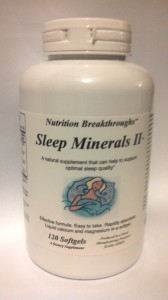
At a time when the use of sleeping drugs is on the increase and their harmful side effects continue to emerge, Nutrition Breakthroughs of Glendale California is announcing an even more formidable soldier in the fight against insomnia — a brand new reformulated Sleep Minerals II. The ingredients are provided in a softgel with healthy oils, making them more quickly absorbable than tablets or capsules and providing a deeper, longer-lasting sleep. Heart-healthy rice bran oil is now the base for the minerals in the product, which include calcium and magnesium, the best-known minerals for sleep and relaxation.
The National Health Service in the United Kingdom spent nearly 50 million on sleep medications (known as “hypnotics”) for their citizens last year. In Canada, the number of prescriptions for hypnotics increased to more than 20 million and an article in Canada.com warns against addition and withdrawal difficulties.
The U.S. Food and Drug Administration web site lists the possible side effects of sleeping drugs as chest pain, severe allergic reactions, memory problems, anxiety, dizziness, headache, suicidal thoughts, as well as sleep-eating, sleep-walking, and getting into the car and driving while not fully awake.
For several years, Sleep Minerals II has been a popular product supplying the needs of people of all ages who prefer not to take sleeping drugs, but would rather use a safe natural remedy. The best thing is that it not only helps with sounder sleep, but contributes to better overall health. Calcium and magnesium are proven to strengthen the bones, protect against colon cancer, alleviate migraines and muscle cramps, reduce restless leg syndrome, support heart health, and relieve the symptoms of menopause and PMS.
Jobee Knight, President of http://www.NutritionBreakthroughs.com says: “Before I developed this product, I was suffering from insomnia and was up for hours in the middle of the night. I decided to put my background as a nutritional researcher to work. When I found these ingredients and began to sleep well, I decided I had to share this with others and Sleep Minerals was born. This newest formula is the result of our purpose at Nutrition Breakthroughs to continually upgrade the quality of our products in line with recent developments in the nutritional field.”
L.C., a Sleep Minerals II customer in Massachusetts, says: “Due to some very stressful issues in my life, I hadn’t slept much in two and a half months and I was prescribed sleeping drugs. I had become dependent and couldn’t sleep without them. I did my research on the Internet and came across Sleep Minerals II. I started taking them before sleeping and now I can sleep through the whole night without drugs. I’m also able to easily fall back asleep if I do get up to use the bathroom in the night..”
Golden rice bran oil is highlighted in the new version of Sleep Minerals II. It is rich in two types of natural vitamin E and also high in Oryzanol (a word that sounds like “Original”), which is a powerful antioxidant only found in rice bran oil. Antioxidants protect our tissues from deterioration and help slow the aging process. Rice bran oil is a heart-healthy oil, proven in an studies to lower cholesterol levels, remedy menopausal symptoms such as hot flashes, strengthen the immune system and protect the retina of the eye.
Lyn K. of Los Angeles, CA. says: “Not only do I sleep much sounder with Sleep Minerals II, it seems to fill in a missing link in my health. I feel stabilized and I’m carried through my day with a stability from the sound rest. Also my heart and eyes feel healthier and stronger.”
Insomnia can wreak havoc on the health and lives of its sufferers, causing excessive daytime sleepiness, extreme lack of energy, irritability and depression. For sleeplessness and insomnia, try putting some Sleep Minerals II into the cupboard to create an arsenal of effective natural remedies.
For more information on Sleep Minerals II visit https://www.nutritionbreakthroughs.com/sleep-minerals-ii-effective-natural-sleep-aid-for-insomnia-nutrition-breakthroughs/


